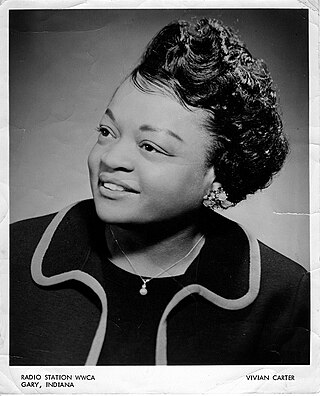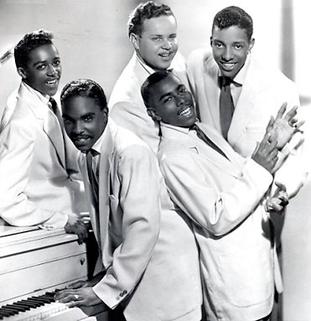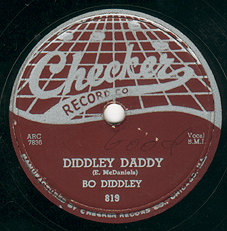
Doo-wop is a subgenre of rhythm and blues music that originated in African-American communities during the 1940s, mainly in the large cities of the United States, including New York, Philadelphia, Pittsburgh, Chicago, Baltimore, Newark, Detroit, Washington, D.C., and Los Angeles. It features vocal group harmony that carries an engaging melodic line to a simple beat with little or no instrumentation. Lyrics are simple, usually about love, sung by a lead vocal over background vocals, and often featuring, in the bridge, a melodramatically heartfelt recitative addressed to the beloved. Harmonic singing of nonsense syllables is a common characteristic of these songs. Gaining popularity in the 1950s, doo-wop was "artistically and commercially viable" until the early 1960s and continued to influence performers in other genres.
Chicago soul is a style of soul music that arose during the 1960s in Chicago. Along with Detroit, the home of Motown, and Memphis, with its hard-edged, gritty performers, Chicago and the Chicago soul style helped spur the album-oriented soul revolution of the early 1970s.

Vee-Jay Records is an American record label founded in the 1950s, located in Chicago and specializing in blues, jazz, rhythm and blues and rock and roll.

States Record Company was a Chicago-based record label. A subsidiary of United Recording, it was in business from May 1952 to December 1957. States focused on rhythm and blues, jazz, and gospel.

Collectables Records is an American reissue record label, founded in 1980 by Jerry Greene. Greene also formed the Lost Nite and Crimson record labels.

Betty Jean Everett was an American soul singer and pianist, best known for her biggest hit single, the million-selling "Shoop Shoop Song ", and her duet "Let It Be Me" with Jerry Butler.
The Spaniels were an American R&B and doo-wop group, best known for the hit "Goodnite, Sweetheart, Goodnite".

"I Wish You Would" is a song recorded by Chicago blues musician Billy Boy Arnold in 1955. It was developed while Arnold was performing with Bo Diddley and incorporates a Diddley-style rhythm. Called "a timeless Chicago blues classic", "I Wish You Would" is Arnold's best-known song and has been recorded by several artists, including the Yardbirds, who recorded it for their debut single in 1964.

"Gee" is a song by American R&B and doo-wop group the Crows, released in June 1953. The song has been credited as the first rock and roll hit by a rock and roll group. It is a doo-wop song, written by William Davis and Viola Watkins, and recorded by the Crows on the independent label, Rama Records, at Beltone Studios in New York City in February 1953. It charted in April 1954, one year later. It took a year to get recognized on Your Hit Parade. It landed No. 2 on the rhythm and blues chart and No. 14 on the pop chart. It was the first 1950s doo-wop record to sell over one million records. Recorded on an independent label, it was one of the first such R&B records to crossover to the wider pop market. Some, including Jay Warner, consider it as the first of the "rock and roll records".

Vivian Carter was an American record company executive who was a founder of Vee-Jay Records with her future husband, Jimmy Bracken. Carter was also a Gary, Indiana, and Chicago, Illinois, radio disc jockey. Vee Jay, an independent record label, became the first successful black-owned recording company in the United States. It released original music from artists of the 1950s and 1960s in a variety of genres, including rhythm and blues, doo-wop, pop, and gospel.
The El Dorados were an American doo-wop group, who achieved their greatest success with the song "At My Front Door", a no. 1 hit on the US Billboard R&B chart in 1955.

The Solitaires were an American doo-wop group, best known for their 1957 hit single "Walking Along". Although they never had a national chart hit, they were one of the most popular vocal groups in New York in the late 1950s.
Chance Records was a Chicago-based label founded in 1950 by Art Sheridan. It specialized in blues, jazz, doo-wop, and gospel.

"Diddley Daddy" is a song by Bo Diddley. The song was issued as a single on Checker Records in June 1955. His second single, it followed on the heels of the success of the eponymous "Bo Diddley." The song spent four weeks on the Billboard R&B chart in the summer of 1955, peaking at No. 11.
Calvin Tollie Carter was an American record producer, record label manager and songwriter of jazz and pop songs.
Arthur "Big Boy" Spires was an American blues singer and guitarist who recorded for several record labels in Chicago in the 1950s and 1960s.

Ewart Gladstone Abner, Jr. was a major American record company executive who was President of Motown Records from 1973 to 1975 and was personal and business manager for Stevie Wonder for 10 years. In his executive roles at Motown, he helped direct careers for Marvin Gaye, Smokey Robinson and the Miracles, The Temptations, and the Jackson 5.
Lefty Bates was an American Chicago blues guitarist. He led the Lefty Bates Combo and worked with the El Dorados, the Flamingos, Jimmy Reed, John Lee Hooker, Buddy Guy, Etta James, the Aristo-Kats, the Hi-De-Ho Boys, the Moroccos, and the Impressions. A regular on the Chicago blues scene, his major work was as a session musician on numerous recordings in the 1950s and 1960s.
The Sheppards was an American, Chicago-based soul and blues vocal group. The group was formed in 1959 by the members of the Ballads and the Bel Aires and was active until 1969. The group was named after producer Bill Sheppard and consisted of Millard Edwards, Jimmy Allen (baritone), James Dennis Isaac, O. C. Perkins, Murrie Eskridge, and Kermit Chandler (guitar). They recorded for Vee-Jay Records, and were featured on compilations such as Tomorrow's Hits (1962).
"God Only Knows" was a regional hit for Philadelphia Doo wop group The Capris. It was their debut single for the group and was written by Ruben Wright. The song also had a dramatic effect on Motown singer Marvin Gaye. It has been covered by other artists as well.










